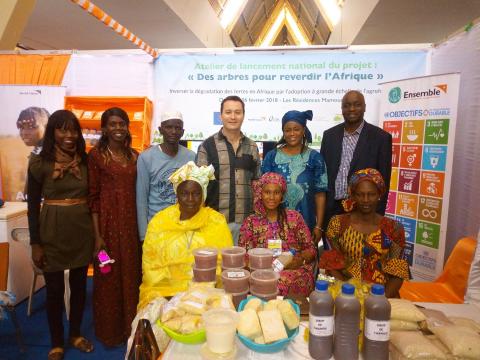World Vision Senegal brings innovation, evidence and impact to FIARA

For two weeks, from March 29 to April 12, 2018, World Vision Senegal has invited all its collaborators and partners to visit and participate in this year's FIARA (International Fair of Agriculture and Animal Resources) exhibition.
For World Vision Senegal, FIARA is an ideal forum for highlighting the fruits of the partnerships between World Vision and various communities, as well as for improving the chances of acquiring new partners for all. In terms of advocacy, we have aspirations to revitalize links with other NGOs and deepen our support for RNA (Assisted Natural Regeneration) by forging ties with the key ministries concerned with this major reforestation policy enshrined in the forest code.
Yandé (in blue), an exhibitor with Mrs. Thérèse Turpin Diatta, President of the Advisory Council (Right)
Priorities harmonized for sustainable development and national strategy
Proceeding on the basis of an innovative and proven approach to sustainable development, World Vision has presented its new RNA project: 'Regreening Africa'. “This project, which is part of both World Vision’s development strategy and the government’s Plan Sénégal Émergent (PSE), boosted by sectoral programs to sustainably manage Senegal's natural and environmental resources, will strengthen the Nationally Determined Contributions. The Regreening Africa project also contributes to the Sustainable Development Goal 13 which advocates 'Take urgent action to combat climate change and its impacts’,” commented World Vision Senegal National Director Dr. Andrew Catford.
A significant impact
Visitors to the stand have enjoyed the opportunity to interact and better understand how significant results are delivered by World Vision's unique approach to community development, with women and children being the primary beneficiaries. Presentations and exhibitions on village dairies, fish farming and beekeeping have also demonstrated how innovation in programs and impact has expanded income-generating activities and improved livelihoods for many vulnerable communities.
Lobé (in white) a cereal processor from Kathiotte
"We thank World Vision for all that it has done and continues to do for the communities. The ADP in Kathiotte where I come from has ended, but the staff have left us a wonderful legacy. There has been a lot of improvement in health with fewer abortions and complications, more children attending school and more women becoming economically active. It was only the training we received in processing local products that enabled us to participate in FIARA," testifies Lobé, a cereal processor from Kathiotte.
In 2017, World Vision Senegal's four strategic objectives determined specific interventions that impacted approximately 2,701,470 children aged 0 to 18 living in Senegal. 2018 will see the strengthening of the presence and effectiveness of World Vision Senegal in the field, through a new programmatic approach to livelihoods. Several successful project models will be implemented to sustainably improve the well-being of children, especially the most vulnerable.
Rokhaya, a processor of local products from Loul Sèssene
Camara, a beekeeper from Vélingara



